特殊疑问词详解及特殊疑问句练习
英语特殊疑问句知识点总结及练习(含答案)

英语特殊疑问句知识点总结及练习特殊疑问句基本概念:通常以特殊疑问词开头,对句中某一成分提问的句子叫特殊疑问句。
常用的疑问词有:what who whose which when where how why等。
可大致分为3种:(简单了解)疑问代词:what,who,which,whose,whom疑问副词:when,where,why,how疑问形容词:what(which,whose)+名词特殊疑问句有两种语序:1.如疑问词作主语或主语的定语,即对主语或主语的定语提问,其语序是陈述句的语序:疑问词(+主语)+谓语动词+其他成分.如:- Who is singing in the room?- Whose bike is broken?2.如疑问词作其他成分,即对其他成分提问,其语序是:疑问词+一般疑问句语序?如:- Which class are you in?- What does she look like?- Where are you from?- What time does he get up every morning?- How do you know?特殊疑问句的回答:1.回答特殊疑问句时,不能用yes / no,即问什么答什么,尤其是简略回答。
如:- Who is from Canada?- Helen (is).- Where's the restaurant?- Near the station.- Why do you like koalas?- Because they are cute.2.特殊疑问句一般读降调(↓)。
一、由what引导的注释:what即“什么”,属于高频使用的特殊疑问题。
(一) What + 系动词 + sb/sth?1、询问“是什么”What's that? It's an apple.那是什么?那是一个苹果。
What's it in English? It's an orange.它用英语怎么说?它是一个orange。
特殊疑问词详解及特殊疑问句练习
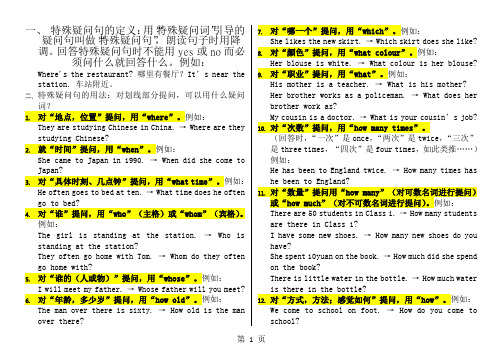
一、特殊疑问句的定义:用“特殊疑问词”引导的疑问句叫做“特殊疑问句”,朗读句子时用降调。
回答特殊疑问句时不能用yes或no而必须问什么就回答什么。
例如:Where's the restaurant? 哪里有餐厅?It’s near the station. 车站附近。
二、特殊疑问句的用法:对划线部分提问,可以用什么疑问词?1.对“地点,位置”提问,用“where”。
例如:They are studying Chinese in China. → Where are they studying Chinese?2.就“时间”提问,用“when”。
例如:She came to Japan in 1990. → When did she come to Japan?3.对“具体时刻、几点钟”提问,用“what time”。
例如:He often goes to bed at ten. → What time does he often go to bed?4.对“谁”提问,用“who”(主格)或“whom”(宾格)。
例如:The girl is standing at the station. → Who is standing at the station?They often go home with Tom. → Whom do they often go home with?5.对“谁的(人或物)”提问,用“whose”。
例如:I will meet my father. → Whose father will you meet?6.对“年龄,多少岁”提问,用“how old”。
例如:The man over there is sixty. → How old is the man over there?7.对“哪一个”提问,用“which”。
例如:She likes the new skirt. → Which skirt does she like?8.对“颜色”提问,用“what colour”。
小学英语特殊疑问句讲解与专项练习(附答案)
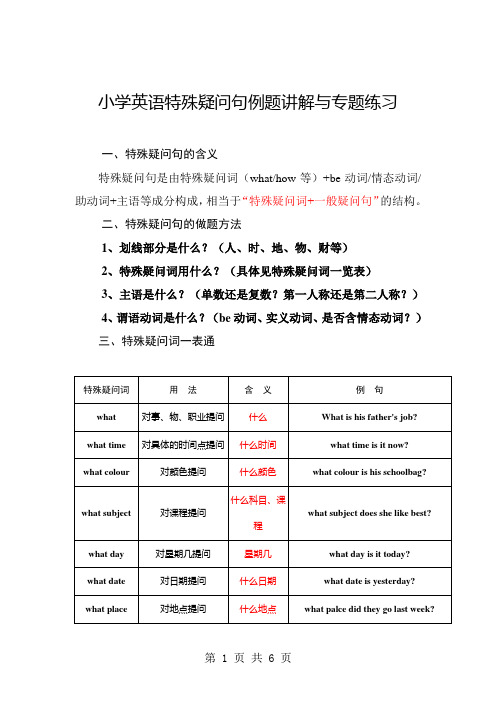
小学英语特殊疑问句例题讲解与专题练习一、特殊疑问句的含义特殊疑问句是由特殊疑问词(what/how等)+be动词/情态动词/助动词+主语等成分构成,相当于“特殊疑问词+一般疑问句”的结构。
二、特殊疑问句的做题方法1、划线部分是什么?(人、时、地、物、财等)2、特殊疑问词用什么?(具体见特殊疑问词一览表)3、主语是什么?(单数还是复数?第一人称还是第二人称?)4、谓语动词是什么?(be动词、实义动词、是否含情态动词?)三、特殊疑问词一表通四、对划线部分提问练习题1. Mike makes cars in a factory .(对划线部分提问)?2.Daniel has a lot of hobbies .(对划线部分提问)?3.His father is a writer . (对划线部分提问)?4.My sister likes dancing .(对划线部分提问)5.The girl under the tree is my sister .(对划线部分提问)?6.My uncle can teach me Chinese .(对划线部分提问)?7.The pen costs me 10 yuan .(对划线部分提问)?8.Jack’s house is 1 km from our school .(对划线部分提问)?9.There are three people in my family .(对划线部分提问)?10.The girl is so beautiful .(对划线部分提问)?11.Mike often goes to school on foot .(对划线部分提问)?12.It’s 7 o’clock now .(对划线部分提问)?13.Mike plays table tennis three times a week .(对划线部分提问)?14.That man is my English teacher .(对划线部分提问)?15.My e-friend comes from the UK .(对划线部分提问)?lie and I will go to the library tomorrow .(对划线部分提问)?17.My parrot is yellow and green .(对划线部分提问)?18.He goes to bed because he is too tired .(对划线部分提问)19 . Tomorrow is Wednesday .(对划线部分提问)?20 . We are going to Australia On September 1st.(对划线部分提问)?21 . The schoolbag is mine .(对划线部分提问)?22 . My grandmother is 76 years old .(对划线部分提问)?五、用特殊疑问词填空1、do you like best ? - I like go fishing best .2、do you like best ? - I like the green colour best .3、do you like best ? - I like Lily best.4、do you like best ? - I like that museum best .5、do you like ? - I like the tallest one .6、book do you like best ? - I like Tom’s book best .7、is your school? - My school is big and beautiful .8、do you play football ? - We play football every week .9、do you get up ? - I get up at half past six in the morning .10、is your father? - My father is 36 years old .参考答案:第五题1.where does Mike make cars?2.How many hobbies does David have ?3.What is his father job?/What does his father do ?4.What does your sister like ?5.Who is the girl under the tree ?6.What subject can your uncle teach ?7.How much is the pen ?8.How far is Jack’s house from your school ?9.How many people are there in your family?10.How is the girl ?11.How does Mike often go to school ?12.What time is it now ?13.How often does Mike play table tennis ?14.Who is that man ?15.Where does your e-friend come from ?16.When will Millie and you go to the library ?17.What colour is your parrot ?18.Why does he go to bed ?19.What day is tomorrow ?20.What date are your going to Australia?21.Whose schoolbag is it ?22.How old is your grandmother ?第六题1.what2.what colour3.who4.where5.which6.whose7.how8.how often9.when/what time 10.how old。
特殊疑问句练习(完整版)
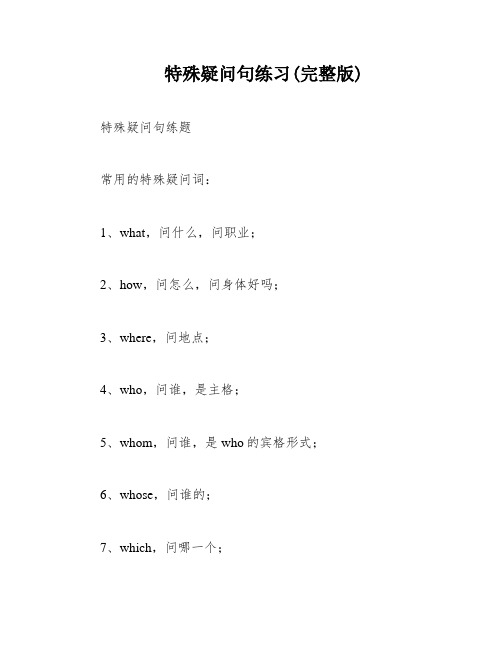
特殊疑问句练习(完整版) 特殊疑问句练题常用的特殊疑问词:1、what,问什么,问职业;2、how,问怎么,问身体好吗;3、where,问地点;4、who,问谁,是主格;5、whom,问谁,是who的宾格形式;6、whose,问谁的;7、which,问哪一个;8、when,问什么时候,是一个较大或较笼统地的时间;9、what time,问具体时刻;10、what day,问星期几;11、what’s the date,问具体日期;12、how long,问多长一段时间,问时间段;13、how far,问距离;14、how soon,问多久;15、how often,问频率,多么经常;16、how old,问多大年龄;17、how many,问可数名词多少;18、how much,问不可数名词多少;问价钱;19、what colour,问什么颜色。
一、选择正确的单词填空(who。
where。
when)1.Who is that pretty girl。
She is my sister.2.Where are Jack and Tom。
They are behind you.3.When do you go to school。
I go to school from Monday to Friday.4.Who has a beautiful flower。
John has a beautiful flower.5.Who are they。
They are my parents.6.Where is my mother。
She is in the living room.7.Where are you going。
We are going to the bakery.8.When do Jim and Wendy play ball。
They play ball in the afternoon.9.When does he jog。
特殊疑问词专项练习(含答案和解析)
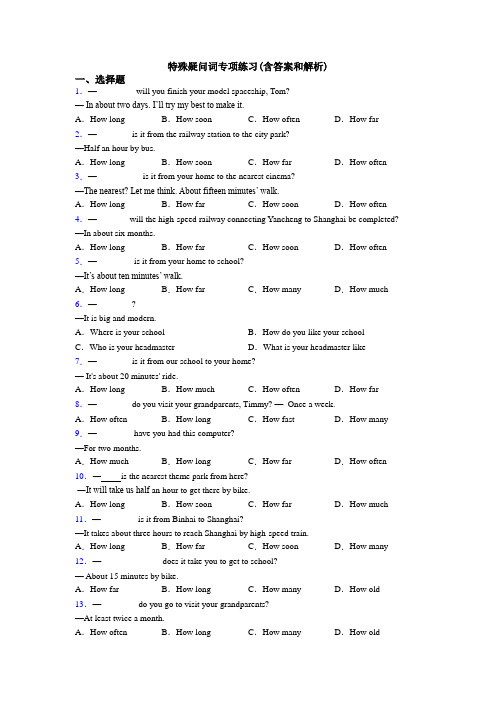
特殊疑问词专项练习(含答案和解析)一、选择题1.— ________ will you finish your model spaceship, Tom?—In about two days. I’ll try my best to make it.A.How long B.How soon C.How often D.How far 2.—________is it from the railway station to the city park?—Half an hour by bus.A.How long B.How soon C.How far D.How often 3.—__________ is it from your home to the nearest cinema?—The nearest? Let me think. About fifteen minutes’ walk.A.How long B.How far C.How soon D.How often 4.—_______ will the high-speed railway connecting Yancheng to Shanghai be completed? —In about six months.A.How long B.How far C.How soon D.How often 5.—________ is it from your home to school?—It’s about ten minutes’ walk.A.How long B.How far C.How many D.How much 6.—________?—It is big and modern.A.Where is your school B.How do you like your school C.Who is your headmaster D.What is your headmaster like7.—________is it from our school to your home?— It's about 20 minutes' ride.A.How long B.How much C.How often D.How far 8.—________do you visit your grandparents, Timmy? — Once a week.A.How often B.How long C.How fast D.How many 9.—________ have you had this computer?—For two months.A.How much B.How long C.How far D.How often 10.― is the nearest theme park from here?―It will take us half an hour to get there by bike.A.How long B.How soon C.How far D.How much 11.—________ is it from Binhai to Shanghai?—It takes about three hours to reach Shanghai by high-speed train.A.How long B.How far C.How soon D.How many 12.— _____________ does it take you to get to school?— About 15 minutes by bike.A.How far B.How long C.How many D.How old 13.—________ do you go to visit your grandparents?—At least twice a month.A.How often B.How long C.How many D.How old14.—________ have you felt like this?—Three days.A.How long B.How often C.How much D.How many 15.—Could you tell me ________ you will come back?—In ten minutes.A.how soon B.how often C.how long D.how fast 16.— ________ is it from your home to the park?—It’s about ten minutes’ walk.A.How often B.How far C.How long D.How soon 17.— The 10th China Flower Expo is being held in Chongming. ________ does it last?— About 40 days.A.How long B.How soon C.How far D.How often 18.—________ is it since the Communist Party of China (中国共产党) was founded?— Ninety-nine years. It’s her 100th birthday next year.A.How often B.How long C.How soon D.How many 19.—________ is it from Qingfeng Lake to Dongying TV Station, Tom?—About 10 minutes’ walk.A.How soon B.How long C.How far D.How much 20.— ____________ is it from here to the centre of the city?—Only one kilometre.A.How long B.How far C.How often D.How much 21.-__________do you sleep every day, Eric?-For about eight hours.A.How much B.How fast C.How often D.How long 22.—________ does May look like?—She is a pretty girl with big bright eyes and long straight hair.A.How B.What C.Which D.Who 23.—________ do you go to the school library?—Twice a week.A.How long B.How often C.How soon D.How much 24.Why not ________ an English club to practice _________ English?A.join; speaking B.to join; speaking C.join; to speak D.to join; to speak 25.—Excuse me, ____ is Xuefeng Park from the hotel?—It's about twenty minutes by bus.A.how much B.how soon C.how far D.how often 26.—Mike, _________ do you have a health examination?—Once a year.A.how long B.how many C.how much D.how often 27.—___________ is Ricky like?—He’s humorous. He often tells us funny jokes.A.He B.What C.Which D.Who28.-_______________ can you get to the airport?-In about 30 minutes. I'm on the way.A.How soon B.How long C.How much D.How often 29.— Bob, ___________ can you have your product ready?—I’m not sure. I’m still waiting for the final design.A.how soon B.how long C.how often D.how far30.-___________ have you worked here?-For just one month.A.How often B.How long C.How soon D.How much 31.—________ is singing over there?—My sister. She likes singing.A.How B.Who C.What D.When32.— will she stay here?— For .A.How soon, one hour and a half B.How long, one and a half hoursC.How soon, one and half hours D.How long, one hour and half33.The air pollution in the small town is getting worse. People have to wear thick masks almost every day. __________ !A.What a shame B.What shame C.What a surprise D.What surprise 34.— will the project of high-speed railway connecting Xuzhou to Lianyungang be completed?—In about two years.A.How long B.How far C.How soon D.How often35.—_______have you studied in this school?—For nearly three years.A.How often B.How far C.How much D.how long 36.—________ is it from your school to your home?—20 minutes by bus.A.How far B.How long C.How soon D.How often 37.—________ will Taizhou hold the 20th Sports Meeting of Jiangsu? —________ next year. A.How long; until B.How soon; until C.When; Not until D.How long; Not until 38.— ________ is it from your school to your home?— 20 minutes by bus.A.How far B.How long C.How soon D.How often 39.—________ will the COVID-19 outbreak be over?—No idea, but Mr. Zhong Nanshan said, “There’s still the possibility that it could end in June.”A.How long B.How often C.How far D.How soon 40.— did you celebrate the Dragon Boat Festival this year, Tod?—By making rice dumplings with my Chinese friends,A.Where B.When C.How D.Why【参考答案】1.B【详解】句意:——汤姆,你多久能完成你的宇宙飞船模型?——大约两天以后。
特殊疑问句专项练习题
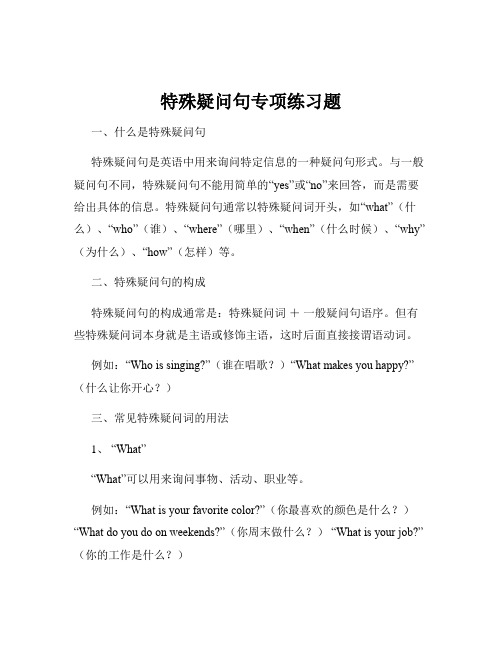
特殊疑问句专项练习题一、什么是特殊疑问句特殊疑问句是英语中用来询问特定信息的一种疑问句形式。
与一般疑问句不同,特殊疑问句不能用简单的“yes”或“no”来回答,而是需要给出具体的信息。
特殊疑问句通常以特殊疑问词开头,如“what”(什么)、“who”(谁)、“where”(哪里)、“when”(什么时候)、“why”(为什么)、“how”(怎样)等。
二、特殊疑问句的构成特殊疑问句的构成通常是:特殊疑问词+一般疑问句语序。
但有些特殊疑问词本身就是主语或修饰主语,这时后面直接接谓语动词。
例如:“Who is singing?”(谁在唱歌?)“What makes you happy?”(什么让你开心?)三、常见特殊疑问词的用法1、“What”“What”可以用来询问事物、活动、职业等。
例如:“What is your favorite color?”(你最喜欢的颜色是什么?)“What do you do on weekends?”(你周末做什么?)“What is your job?”(你的工作是什么?)2、“Who”“Who”用于询问人。
比如:“Who is your best friend?”(谁是你最好的朋友?)“Who broke the window?”(谁打破了窗户?)3、“Where”“Where”询问地点。
例如:“Where do you live?”(你住在哪里?)“Where is the library?”(图书馆在哪里?)4、“When”“When”问时间。
比如:“When is your birthday?”(你的生日是什么时候?)“When did you come back?”(你什么时候回来的?)5、“Why”“Why”用于询问原因。
例如:“Why are you late?”(你为什么迟到?)“Why do you like English?”(你为什么喜欢英语?)6、“How”“How”的用法比较多样,可以询问方式、程度、身体状况等。
特殊疑问词详解及特殊疑问句练习
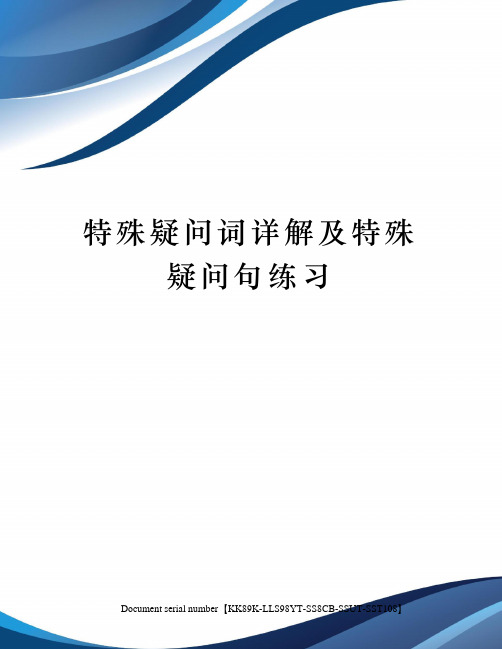
特殊疑问词详解及特殊疑问句练习Document serial number【KK89K-LLS98YT-SS8CB-SSUT-SST108】【发卷日期】2013年______月_______日【学生姓名】__________________________一、特殊疑问句的定义:用“特殊疑问词”引导的疑问句叫做“特殊疑问句”,朗读句子时用降调。
回答特殊疑问句时不能用yes或no而必须问什么就回答什么。
例如:Where'stherestaurant?哪里有餐厅?It’snearthestation.车站附近。
二、特殊疑问句的用法:对划线部分提问,可以用什么疑问词?1.对“地点,位置”提问,用“where”。
例如:TheyarestudyingChineseinChina.→WherearetheystudyingChinese?2.就“时间”提问,用“when”。
例如:ShecametoJapanin1990.→WhendidshecometoJapan?3.对“具体时刻、几点钟”提问,用“whattime”。
例如:Heoftengoestobedatten.→Whattimedoesheoftengotobed?4.对“谁”提问,用“who”(主格)或“whom”(宾格)。
例如:Thegirlisstandingatthestation.→Whoisstandingatthestation?TheyoftengohomewithTom.→Whomdotheyoftengohomewith?5.对“谁的(人或物)”提问,用“whose”。
例如:Iwillmeetmyfather.→Whosefatherwillyoumeet?6.对“年龄,多少岁”提问,用“howold”。
例如:Themanoverthereissixty.→Howoldisthemanoverthere?7.对“哪一个”提问,用“which”。
特殊疑问句讲解与练习

特殊疑问句讲解与练习特殊疑问句是一种由疑问词引导的句子,不同的疑问词用于询问不同的对象。
这种句子的结构是“疑问词+一般疑问句的句式”,也就是“疑问词+系动词/助动词/情态动词+主语+其他成分”。
特殊疑问句不能用Yes或No来回答,而需要对所询问的对象有针对性地回答。
下面是一些常用的特殊疑问词及其用法:who:用于询问人的身份、姓名等。
例如,“Who is he?”whose:用于询问所属关系。
例如,“Whose book is this?”when:用于询问时间。
例如,“When do you play games?”where:用于询问地点。
例如,“Where do you play games on Sunday?”why:用于询问原因。
例如,“Why isn't he at school today?”which:用于在一定范围内特指的人或物。
例如,“Which box is yours?”what:用于询问人的职业或事物是什么。
例如,“What is he?”what color:用于询问颜色。
例如,“What color is your skirt?”what time:用于询问时间,相当于“几点”。
例如,“What time do you play games?”what day:用于询问星期几。
例如,“What day is it today?”how:用于询问健康状况、做事的方式、程度等。
例如,“How is he?”(问健康状况)I ride my bike to go home。
How do you usually commute。
The river is about 100 meters wide。
How deep is the river。
What is your age。
He is ten years old。
How many boys are there in your class。
英语特殊疑问句讲解及例句
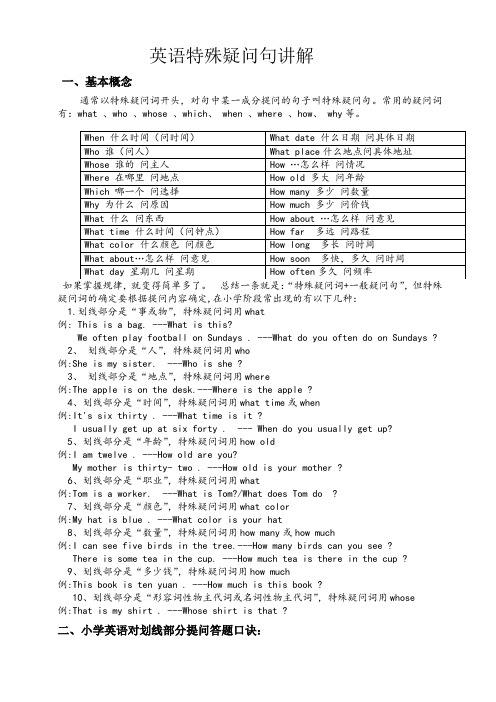
英语特殊疑问句讲解一、基本概念通常以特殊疑问词开头,对句中某一成分提问的句子叫特殊疑问句。
常用的疑问词有:what 、who 、whose 、which、 when 、where 、how、 why等。
When 什么时间(问时间)What date 什么日期问具体日期Who 谁(问人)What place什么地点问具体地址Whose 谁的问主人How …怎么样问情况Where 在哪里问地点How old 多大问年龄Which 哪一个问选择How many 多少问数量Why 为什么问原因How much 多少问价钱What 什么问东西How about …怎么样问意见What time 什么时间(问钟点)How far 多远问路程What color 什么颜色问颜色How long 多长问时间What about…怎么样问意见How soon 多快,多久问时间What day 星期几问星期How often多久问频率如果掌握规律,就变得简单多了。
总结一条就是:“特殊疑问词+一般疑问句”,但特殊疑问词的确定要根据提问内容确定,在小学阶段常出现的有以下几种:1.划线部分是“事或物”,特殊疑问词用what例: This is a bag. ---What is this?We often play football on Sundays . ---What do you often do on Sundays ?2、划线部分是“人”,特殊疑问词用who例:She is my sister. ---Who is she ?3、划线部分是“地点”,特殊疑问词用where例:The apple is on the desk.---Where is the apple ?4、划线部分是“时间”,特殊疑问词用what time或when例:It's six thirty . ---What time is it ?I usually get up at six forty . --- When do you usually get up?5、划线部分是“年龄”,特殊疑问词用how old例:I am twelve . ---How old are you?My mother is thirty- two . ---How old is your mother ?6、划线部分是“职业”,特殊疑问词用what例:Tom is a worker. ---What is Tom?/What does Tom do ?7、划线部分是“颜色”,特殊疑问词用what color例:My hat is blue . ---What color is your hat8、划线部分是“数量”,特殊疑问词用how many或how much例:I can see five birds in the tree.---How many birds can you see ?There is some tea in the cup. ---How much tea is there in the cup ?9、划线部分是“多少钱”,特殊疑问词用how much例:This book is ten yuan . ---How much is this book ?10、划线部分是“形容词性物主代词或名词性物主代词”,特殊疑问词用whose 例:That is my shirt . ---Whose shirt is that ?二、小学英语对划线部分提问答题口诀:一代(用疑问词代替提问部分),二移(把疑问词移至句首),三找(找is , are ,can,would)抄在疑问词后,没有则用do,does(用于主语是第三人称),出现I am 则直接改为Are you),四抄(照抄其它部分)五改(出现some,要考虑是否改为any。
特殊疑问词讲解+练习
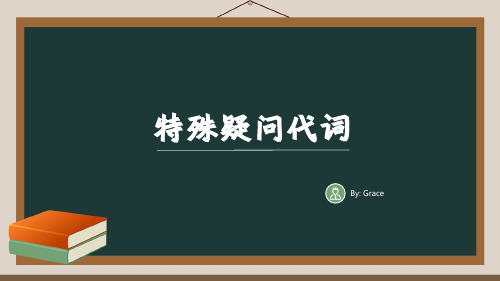
What
Who
How
Whose
6. Which
定语 --- Which boy is Li Ming? --- The boy under the tree is Li Ming.
选择 --- Which dress do you prefer, the red one or the blue one? --- The red one.
特殊疑问代词
By: Grace
特殊疑问词
疑问代词在句中用来构成特殊疑问句
特殊疑问句 =特殊疑问代词+一般疑问句?
1. What
--- What's this? --- It's a dog/a book.
物
--- What are you doing? 动作
--- I'm reading a book.
2) We buy food at the market.
Where do you buy food?
3) Li Ming often does homework in his bedroom.
Where does LM do homework?
Timo'ns footsiint the roLoimlyfinetigerhis Where
2) He is happy because he wins the game.
Why is he happy?
时间
8. When
--- When do you read books? --- I read books in the morning.
--- When is Teachers's Day? --- It's on September 10th.
(完整版)特殊疑问词专项练习及解析
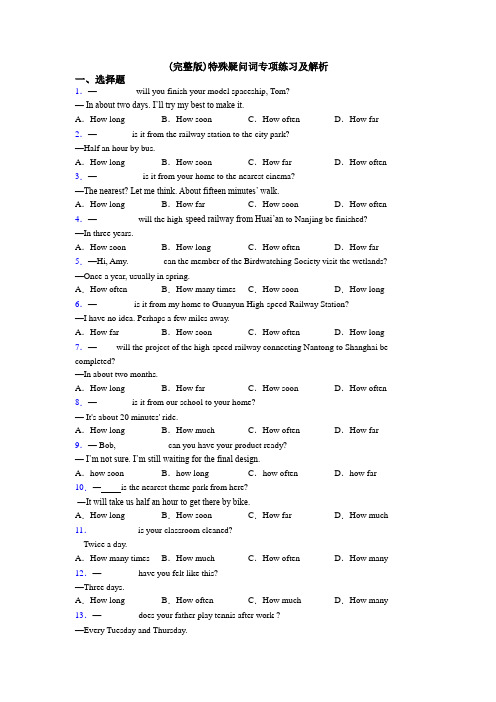
(完整版)特殊疑问词专项练习及解析一、选择题1.— ________ will you finish your model spaceship, Tom?—In about two days. I’ll try my best to make it.A.How long B.How soon C.How often D.How far 2.—________is it from the railway station to the city park?—Half an hour by bus.A.How long B.How soon C.How far D.How often 3.—__________ is it from your home to the nearest cinema?—The nearest? Let me think. About fifteen minutes’ walk.A.How long B.How far C.How soon D.How often 4.—_________ will the high-speed railway from Huai’an to Nanjing be finished?—In three years.A.How soon B.How long C.How often D.How far 5.—Hi, Amy.________can the member of the Birdwatching Society visit the wetlands?—Once a year, usually in spring.A.How often B.How many times C.How soon D.How long 6.—________ is it from my home to Guanyun High-speed Railway Station?—I have no idea. Perhaps a few miles away.A.How far B.How soon C.How often D.How long 7.—____ will the project of the high-speed railway connecting Nantong to Shanghai be completed?—In about two months.A.How long B.How far C.How soon D.How often 8.—________is it from our school to your home?— It's about 20 minutes' ride.A.How long B.How much C.How often D.How far 9.— Bob, ___________ can you have your product ready?—I’m not sure. I’m still waiting for the final design.A.how soon B.how long C.how often D.how far 10.― is the nearest theme park from here?―It will take us half an hour to get there by bike.A.How long B.How soon C.How far D.How much 11.---________ is your classroom cleaned?---Twice a day.A.How many times B.How much C.How often D.How many 12.—________ have you felt like this?—Three days.A.How long B.How often C.How much D.How many 13.—________ does your father play tennis after work ?—Every Tuesday and Thursday.A.How often B.How soon C.How much D.How long 14.— ________ is it from your home to the park?—It’s about ten minutes’ walk.A.How often B.How far C.How long D.How soon 15.— The 10th China Flower Expo is being held in Chongming. ________ does it last?— About 40 days.A.How long B.How soon C.How far D.How often 16.—________ do you read Duowei Reading books, Jack?—Once a week.A.How much B.How often C.How long D.How soon 17.—A nice T-shirt! ________ is it?—It’s 50 yuan.A.How long B.How far C.How much D.How old 18.—________ is it since the Communist Party of China (中国共产党) was founded?— Ninety-nine years. It’s her 100th birthday next year.A.How often B.How long C.How soon D.How many 19.—________ is it from Qingfeng Lake to Dongying TV Station, Tom?—About 10 minutes’ walk.A.How soon B.How long C.How far D.How much 20.—_________ will Changzhou Metro Line 2 start to use?—_________ the end of this year.A.How long; Not until B.How long; Until C.How soon; Not until D.How soon; Until 21.— ________ orange juice does she need?— Just a little.A.How much B.How long C.How many D.How far 22.—________ did it take J.K. Rowling to write the Harry Potter series?—Over 15 years.A.How soon B.How often C.How long D.How far 23.________ are you doing here, baby? Yo u must go to bed. It’s late.A.What B.Who C.When D.Where 24.—________ does May look like?—She is a pretty girl with big bright eyes and long straight hair.A.How B.What C.Which D.Who25.—________ do you go to the school library?—Twice a week.A.How long B.How often C.How soon D.How much 26.—________ do you play basketball with your friends?— Only once a week.A.How long B.How much C.How soon D.How often 27.Why not ________ an English club to practice _________ English?A.join; speaking B.to join; speaking C.join; to speak D.to join; to speak28.—___________ is Ricky like?—He’s humorous. He often tells us funny jokes.A.He B.What C.Which D.Who29.—_______will we take off our masks in class?—_______we can find out medicine to cure the disease completely.A.How long, Not until B.How soon, Not until C.How long, Until D.How soon, Until 30.---- does Joanna take the course in DIY?----Every Saturday afternoon.A.How long B.How much C.How soon D.How often31.—________ is it from your school to your home?—It’s about 10 minutes’ walk.A.How far B.How long C.How often D.How much 32.— ________ is it from your home to the bank?—About ten minutes’ walk.A.How often B.How far C.How long D.How much 33.—I heard that you were a volunteer in Huai'an Marathon. ________ was it?—It was about 42 kilometres.A.How much B.How far C.How long D.How many 34.—________ will Taizhou hold the 20th Sports Meeting of Jiangsu? —________ next year. A.How long; until B.How soon; until C.When; Not until D.How long; Not until 35.—________ does the Qinhuai Lantern Show usually last?— For about fifty days.A.How far B.How often C.How long D.How much 36.— ________ is it from your school to your home?— 20 minutes by bus.A.How far B.How long C.How soon D.How often 37.—________ is it from Binhai to Shanghai?—It takes about three hours to reach Shanghai by high-speed train.A.How long B.How far C.How soon D.How many 38.—________ will you finish doing your work?—In a week.A.How often B.How soon C.How long D.How far39.- will the invitations be sent to our guests?-In three days.A.How often B.How soon C.How long D.How far40.–Mr Black, _______ will the parents’ meeting last?-It’s hard to say. Maybe one hour more.A.how long B.how much C.how far D.how often【参考答案】一、选择题1.B【详解】句意:——汤姆,你多久能完成你的宇宙飞船模型?——大约两天以后。
特殊疑问句讲解与练习
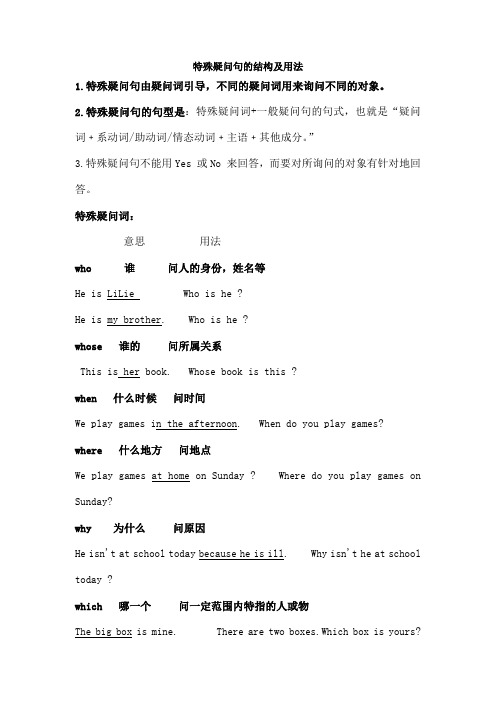
特殊疑问句的结构及用法1.特殊疑问句由疑问词引导,不同的疑问词用来询问不同的对象。
2.特殊疑问句的句型是:特殊疑问词+一般疑问句的句式,也就是“疑问词﹢系动词/助动词/情态动词﹢主语﹢其他成分。
”3.特殊疑问句不能用Yes 或No 来回答,而要对所询问的对象有针对地回答。
特殊疑问词:意思用法who 谁问人的身份,姓名等He is LiLie Who is he ?He is my brother. Who is he ?whose 谁的问所属关系This is her book. Whose book is this ?when 什么时候问时间We play games in the afternoon. When do you play games?where 什么地方问地点We play games at home on Sunday ? Where do you play games on Sunday?why 为什么问原因He isn't at school today because he is ill. Why isn't he at school today ?which 哪一个问一定范围内特指的人或物The big box is mine. There are two boxes.Which box is yours?Which apple do you like? I like the smaller one.what 什么问人的职业或事物是什么He is a worker. What is he?He has a book. What does he have ?what color 什么颜色问颜色My skirt is red. What color is your skirt?what time 几点问时间 =whenWe play games at five in the afternoon ? What time do you play games?what day 星期几问星期几What day is it today It is Monday.how 怎样问健康状况、做事的方式、程度等He is fine/strong. How is he ?(问健康状况)I go home by bike. How do you go home?(问做事的方式)The river is 100 meters. How deep is the river? (问程度)how old 几岁问年龄He is ten. How old is he ?how many 多少跟可数名词复数,问数量There are thirty boys in my class. How many boys are there in your class?how much 多少/多少钱跟不可数名词,问数量或价钱There is some milk in the bottle. How much milk is there in thebottle?(问数量)How much is the dress? It’s 50 yuan.(问价钱)how far 多远问路程It's five kilometers away from here? How far is it from here?注意:特殊疑问句的回答不能用Yes/No,要有是在的回答。
(完整版)特殊疑问词专项练习附解析
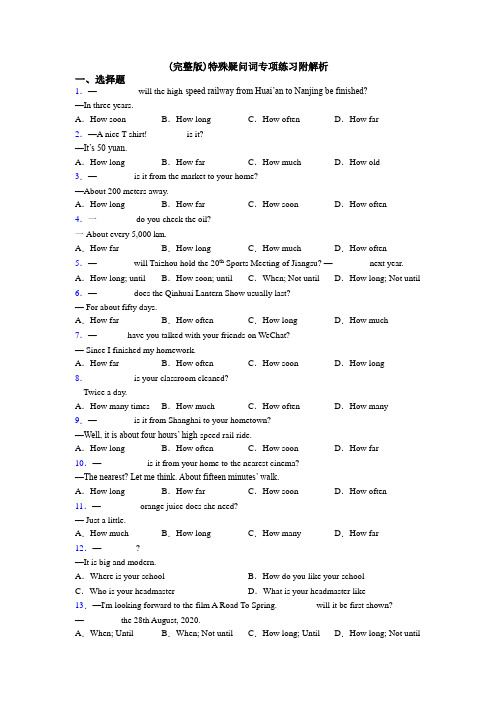
(完整版)特殊疑问词专项练习附解析一、选择题1.—_________ will the high-speed railway from Huai’an to Nanjing be finished?—In three years.A.How soon B.How long C.How often D.How far2.—A nice T-shirt! ________ is it?—It’s 50 yuan.A.How long B.How far C.How much D.How old3.—________ is it from the market to your home?—About 200 meters away.A.How long B.How far C.How soon D.How often4.一 ________ do you check the oil?一About every 5,000 km.A.How far B.How long C.How much D.How often 5.—________ will Taizhou hold the 20th Sports Meeting of Jiangsu? —________ next year. A.How long; until B.How soon; until C.When; Not until D.How long; Not until 6.—________ does the Qinhuai Lantern Show usually last?— For about fifty days.A.How far B.How often C.How long D.How much 7.— ______ have you talked with your friends on WeChat?— Since I finished my homework.A.How far B.How often C.How soon D.How long8.---________ is your classroom cleaned?---Twice a day.A.How many times B.How much C.How often D.How many 9.—________ is it from Shanghai to your hometown?—Well, it is about four hours’ high-speed rail ride.A.How long B.How often C.How soon D.How far10.—__________ is it from your home to the nearest cinema?—The nearest? Let me think. About fifteen minutes’ walk.A.How long B.How far C.How soon D.How often 11.— ________ orange juice does she need?— Just a little.A.How much B.How long C.How many D.How far12.—________?—It is big and modern.A.Where is your school B.How do you like your schoolC.Who is your headmaster D.What is your headmaster like13.—I'm looking forward to the film A Road To Spring. ________ will it be first shown?—________ the 28th August, 2020.A.When; Until B.When; Not until C.How long; Until D.How long; Not until14.—________ have you been away from your hometown?—For about 15 years.A.How many B.How long C.How much D.How often 15.—________ is it from Euro-Disney to the centre of Paris? —It's just an hour’s ride. A.How long B.How far C.How fast D.How much 16.— ____________ is it from here to the centre of the city?—Only one kilometre.A.How long B.How far C.How often D.How much 17.— _____________ does it take you to get to school?— About 15 minutes by bike.A.How far B.How long C.How many D.How old 18.—________ do your parents come to visit you in the US, Tom?—Once a year.A.How often B.How long C.How soon D.How far 19.—______ do you think we can finish the report?—Perhaps in one more hour.A.How long B.How much C.How soon D.How often 20.—_______will we take off our masks in class?—_______we can find out medicine to cure the disease completely.A.How long, Not until B.How soon, Not until C.How long, Until D.How soon, Until 21.-___________ have you worked here?-For just one month.A.How often B.How long C.How soon D.How much 22.—________ is it from your school to your home?—It’s about 10 minutes’ walk.A.How far B.How long C.How often D.How much 23.—________ did it take J.K. Rowling to write the Harry Potter series?—Over 15 years.A.How soon B.How often C.How long D.How far 24.________ are you doing here, baby? You must go to bed. It’s late.A.What B.Who C.When D.Where 25.—________ do you play basketball with your friends?— Only once a week.A.How long B.How much C.How soon D.How often 26.Why not ________ an English club to practice _________ English?A.join; speaking B.to join; speaking C.join; to speak D.to join; to speak 27.—________ are you looking for, madam? I think everyone is here.—I don’t think so. Where’s David?A.Who B.What C.When D.Where 28.—Mike, _________ do you have a health examination?—Once a year.A.how long B.how many C.how much D.how often 29.—________ is it since the Party of China was founded?—It’s her 100th birthday this year. Got it?A.How often B.How soon C.How long D.How old 30.— did you celebrate the Dragon Boat Festival this year, Tod?—By making rice dumplings with my Chinese friends,A.Where B.When C.How D.Why31.—________ is singing over there?—My sister. She likes singing.A.How B.Who C.What D.When32.–Mr Black, _______ will the parents’ meeting last?-It’s hard to say. Maybe one hour more.A.how long B.how much C.how far D.how often33.---- does Joanna take the course in DIY?----Every Saturday afternoon.A.How long B.How much C.How soon D.How often34.---________is it from the Children's Palace to Nanjing South Railway Station, Tom?--- About 10 minutes' ride by busA.How soon B.How long C.How far D.How much 35.The air pollution in the small town is getting worse. People have to wear thick masks almost every day. __________ !A.What a shame B.What shame C.What a surprise D.What surprise 36.— will the project of high-speed railway connecting Xuzhou to Lianyungang be completed?—In about two years.A.How long B.How far C.How soon D.How often37.---_____do you visit your grandparents, Timmy?---Once a week.A.How many B.How long C.How much D.How often 38.—Millie, ________ do you take the course in DIY?—Every Saturday afternoon.A.how long B.how far C.how much D.how often 39.—I went from a school desk to a ship in my teens.—_________ days would you be at sea? Homesick?A.How long B.How many C.How much D.How soon 40.—___________ is Ricky like?—He’s humorous. He often tells us funny jokes.A.He B.What C.Which D.Who【参考答案】一、选择题1.A【详解】句意:——从淮安到南京的高速铁路多久才能完成?——三年后。
中考英语特殊疑问词练习题40篇及解析
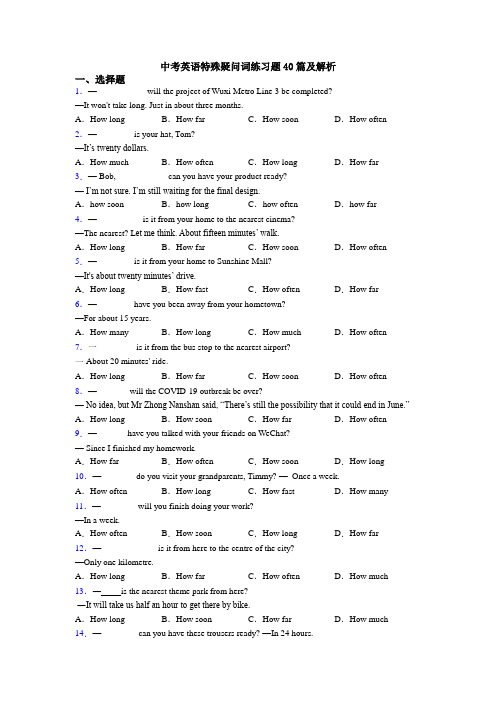
中考英语特殊疑问词练习题40篇及解析一、选择题1.—___________ will the project of Wuxi Metro Line 3 be completed?—It won't take long. Just in about three months.A.How long B.How far C.How soon D.How often 2.—________ is your hat, Tom?—It’s twenty dollars.A.How much B.How often C.How long D.How far 3.— Bob, ___________ can you have your product ready?—I’m not sure. I’m still waiting for the final design.A.how soon B.how long C.how often D.how far 4.—__________ is it from your home to the nearest cinema?—The nearest? L et me think. About fifteen minutes’ walk.A.How long B.How far C.How soon D.How often 5.—________ is it from your home to Sunshine Mall?—It's about twenty minutes’ drive.A.How long B.How fast C.How often D.How far 6.—________ have you been away from your hometown?—For about 15 years.A.How many B.How long C.How much D.How often 7.一 ________ is it from the bus stop to the nearest airport?一About 20 minutes' ride.A.How long B.How far C.How soon D.How often 8.—_______ will the COVID-19 outbreak be over?—No idea, but Mr Zhong Nanshan said, “There’s still the possibility that it could end in June.”A.How long B.How soon C.How far D.How often 9.— ______ have you talked with your friends on WeChat?— Since I finished my homework.A.How far B.How often C.How soon D.How long 10.—________do you visit your grandparents, Timmy? — Once a week.A.How often B.How long C.How fast D.How many 11.—________ will you finish doing your work?—In a week.A.How often B.How soon C.How long D.How far 12.— ____________ is it from here to the centre of the city?—Only one kilometre.A.How long B.How far C.How often D.How much 13.― is the nearest theme park from here?―It will take us half an hour to get there by bike.A.How long B.How soon C.How far D.How much 14.—________ can you have these trousers ready? —In 24 hours.A.How soon B.How long C.How often D.How many 15.— ________ will you finish your model spaceship, Tom?—In about two days. I’ll try my best to make it.A.How long B.How soon C.How often D.How far 16.—________ do you go to visit your grandparents?—At least twice a month.A.How often B.How long C.How many D.How old 17.—________ do your parents come to visit you in the US, Tom?—Once a year.A.How often B.How long C.How soon D.How far 18.—________ does your father play tennis after work ?—Every Tuesday and Thursday.A.How often B.How soon C.How much D.How long 19.—________ is it since the Communist Party of China (中国共产党) was founded?— Ninety-nine years. It’s her 100th birthday next year.A.How often B.How long C.How soon D.How many 20.—_________ will Changzhou Metro Line 2 start to use?—_________ the end of this year.A.How long; Not until B.How long; Until C.How soon; Not until D.How soon; Until 21.—________ will the Jinniu Lake Animal Kingdom be open?—Maybe in the second half of this year.A.When B.Who C.What D.Where 22.—________ do you go to the school library?—Twice a week.A.How long B.How often C.How soon D.How much 23.—Millie, ________ are you reading?—Camel Xiangzi, by the famous Chinese writer, Lao She.A.who B.how C.where D.what24.—________ do you play basketball with your friends?— Only once a week.A.How long B.How much C.How soon D.How often 25.—________ is the concert going to start?—I’ve no idea. Why not check the ticket?A.What time B.What about C.How long D.How often 26.Why not ________ an English club to practice _________ English?A.join; speaking B.to join; speaking C.join; to speak D.to join; to speak 27.—Excuse me, ____ is Xuefeng Park from the hotel?—It's about twenty minutes by bus.A.how much B.how soon C.how far D.how often 28.—________ are you looking for, madam? I think everyone is here.—I don’t think so. Where’s David?A.Who B.What C.When D.Where 29.---________ is your classroom cleaned?---Twice a day.A.How many times B.How much C.How often D.How many 30.–Mr Black, _______ will the parents’ meeting last?-It’s hard to say. Maybe one hour more.A.how long B.how much C.how far D.how often 31.—________ is it from your school to your home?—It’s about 10 minutes’ walk.A.How far B.How long C.How often D.How much 32.— are you handing out the leaflets for?—To ask people to care more about the left-behind children.A.How B.Why C.What D.Who 33.---- does Joanna take the course in DIY?----Every Saturday afternoon.A.How long B.How much C.How soon D.How often34.— _______ are you going to the School Uniform Exhibition, Amy ?— To learn about different styles of school uniform.A.What B.Where C.Why D.Which 35.---_____do you visit your grandparents, Timmy?---Once a week.A.How many B.How long C.How much D.How often 36.—Millie, ________ do you take the course in DIY?—Every Saturday afternoon.A.how long B.how far C.how much D.how often 37.—________ is it since the Party of China was founded?—It’s her 100th birthday this year. Got it?A.How often B.How soon C.How long D.How old 38.—I heard that you were a volunteer in Huai'an Marathon. ________ was it?—It was about 42 kilometres.A.How much B.How far C.How long D.How many 39.—________ is it from Binhai to Shanghai?—It takes about three hours to reach Shanghai by high-speed train.A.How long B.How far C.How soon D.How many 40.— did you celebrate the Dragon Boat Festival this year, Tod?—By making rice dumplings with my Chinese friends,A.Where B.When C.How D.Why【参考答案】一、选择题1.C【详解】句意:——无锡地铁三号线工程将在多久完成?——不会花很长时间。
- 1、下载文档前请自行甄别文档内容的完整性,平台不提供额外的编辑、内容补充、找答案等附加服务。
- 2、"仅部分预览"的文档,不可在线预览部分如存在完整性等问题,可反馈申请退款(可完整预览的文档不适用该条件!)。
- 3、如文档侵犯您的权益,请联系客服反馈,我们会尽快为您处理(人工客服工作时间:9:00-18:30)。
【发卷日期】2013年______月_______日【学生姓名】__________________________一、特殊疑问句的定义:用“特殊疑问词”引导的疑问句叫做“特殊疑问句”,朗读句子时用降调。
回答特殊疑问句时不能用yes或no而必须问什么就回答什么。
例如:Where's the restaurant? 哪里有餐厅?It’s near the station. 车站附近。
二、特殊疑问句的用法:对划线部分提问,可以用什么疑问词?1.对“地点,位置”提问,用“where”。
例如:They are studying Chinese in China. → Where are they studying Chinese?2.就“时间”提问,用“when”。
例如:She came to Japan in 1990. → When did she come to Japan?3.对“具体时刻、几点钟”提问,用“what time”。
例如:He often goes to bed at ten. → What time does he often go to bed?4.对“谁”提问,用“who”(主格)或“whom”(宾格)。
例如:The girl is standing at the station. →Who is standing at the station?They often go home with Tom. → Whom do they often go home with?5.对“谁的(人或物)”提问,用“whose”。
例如:I will meet my father. → Whose father will you meet?6.对“年龄,多少岁”提问,用“how old”。
例如:The man over there is sixty. → How old is the manover there?7.对“哪一个”提问,用“which”。
例如:She likes the new skirt. → Which skirt does she like?8.对“颜色”提问,用“what colour”。
例如:Her blouse is white. → What colour is her blouse?9.对“职业”提问,用“what”。
例如:His mother is a teacher. → What is his mother?Her brother works as a policeman. → What does her brother work as?My cousin is a doctor. → What is your cousin’s job?10.对“次数”提问,用“how many times”。
(回答时,“一次”是once,“两次”是twice,“三次”是three times,“四次”是four times,如此类推……)例如:He has been to England twice. → How many times has he been to England?11.对“数量”提问用“how many”(对可数名词进行提问)或“how much”(对不可数名词进行提问)。
例如:There are 50 students in Class 1. →How many students are there in Class 1?I have some new shoes. → How many new shoes do youhave?She spent 10yuan on the book. → How much did she spend on the book?There is little water in the bottle. → How much water is there in the bottle?12.对“方式,方法;感觉如何”提问,用“how”。
例如:We come to school on foot. → How do you come to1school?She is feeling much better now. → How is she feeling now?13.对“原因”提问,用“why”,回答时常用because开头。
例如:He didn’t come because he was ill yesterday.→ Why didn’t he come yesterday?14.对“做什么”提问,用“what…do/doing/done”。
例如:He works as a worker. → What does he do?(问职业)We are looking at the blackboard. → What are you doing?(问正在做什么)They have seen the film. → What have they done?(问做过什么)15.对“一段时间,花了多长时间”提问,用“how long”。
(常跟一般现在时连用。
回答时,for+时间段,since+时间点。
)例如:We have stayed here for six years. → How long have you stayed here?He has worked in Beijing since 1980. → How long has he worked in Beijing?16.对“频度、频率”提问,用how often。
(回答时,经常会用到“频度副词”:always总是,usually 通常,often经常,sometimes有时,seldom很少,never 从不)例如:She is late for school once a week. → How often is she late for school?We sometimes get up at 10:00. → How often do you get up at 10:00?17.对“将来要做的某事”提问,用“how soon”。
(常和“一般将来时”连用)例如:Lucy will be back in four days. → How soon will Lucy be back?18.对“高度”提问用“how tall”(表示人)或“how high”(表示物)。
例如:The man is 2 metres tall. → How tall is the man?The hill is 300 metres high. → How high is the hill?19.对“重量”提问,用“how heavy”;对“大小”提问,用“how big”。
例如:The elephant weighs 3 tons. → How heavy does the elephant weigh?The stone is about 11 metres long, 5 metres wide, 7 metres high.→ How big is the stone?20.对“物品长度,”提问,用“how long”;对“物品宽度”提问,用“how wide”。
例如:The desk is 4 metres long. → How long is the desk?The river is 100 metres wide. → How wide is the river?21.对“星期几”提问,用“what day”。
(欧美国家习惯把星期天视作每周第1天)例如:Today is Friday. → What day is today?22.对“日期”提问,用“what…the date”。
(英式的日期表示方式:日/月/年;美式的日期表示方式:月/日/年)例如:Yesterday was 1 July, 1995.(英式)或Yesterday was July 1, 1995.(美式)→ What was the date yesterday?2323. 对“距离”提问,用“how far ”。
(有时需用“花多长时间乘搭某种交通工具”作为表示“距离”的方式,此时切勿与“how long ”搞混)例如: It ’s 2 miles from my home to school. → How far is it from your home to school?24. 对“尺寸,尺码”提问,用“what size ”。
例如: I want size 42 shoes. → What size shoesdo you want? 25. 对“天气状况”提问,用“What …the weather like?”或“How …the weather ”。
例如:Today is rainy. → What is the weather like today? 或How is the weather today?26. 对“天气的温度”提问,用以下几种方式提问: (1)What temperature is it today? (2)How many degrees is it today? (3)What is the temperature today?1. A: ___________________________ is it? B: It ’s half past six.42. A: ___________________________ is Mary from? B: America.3. A: ___________________________ is your school from here? B: 5 kilometers.4. A: ___________________________ is that girl? B: She ’s my classmate, Linda.5. A: ___________________________ are you? B: Fine, thanks.6. A: ___________________________ pencils do you have? B: I have three.7. A: ___________________________ ball is this? B: It ’s Peter ’s. 8. A: ___________________________ boy is Billy? B: That fat boy. 9. A: ___________________________ don ’t you like mice? B: They are too dirty.10. A: ___________________________ is your brother? B: He ’s ten. 11. A: ___________________________ do you go home? B: By bus.12. A: ___________________________ is nine and two? B: Eleven.13. A: ___________________________ water is there in the bottle? B: A little. 14. A: ___________________________ does your aunt do? B: She is a nurse.15. A: ___________________________ crossed the river fast? B: Joe did.16. A: ___________________________ did you go to Beijing? B: Last summer.【练习2】选词填空。
